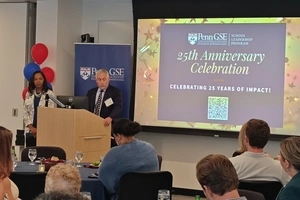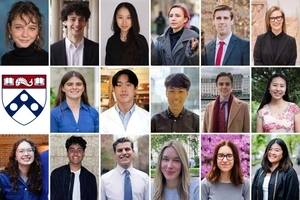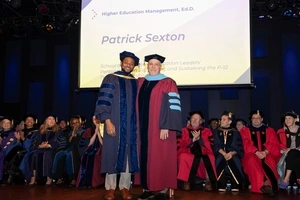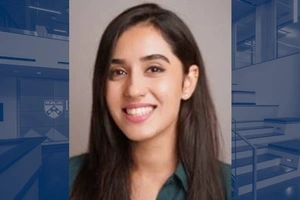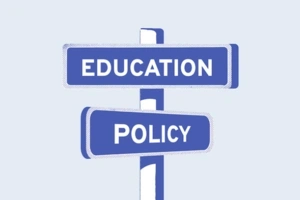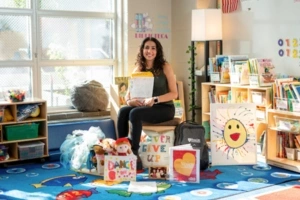How are educational leaders gathering wisdom from tumultuous times and envisioning the road ahead? Three distinguished Penn GSE alumni—a school principal, a school superintendent, and a college president—shared their perspectives on finding strength in the face of adversity, supporting mental health, and rallying to improve social justice during the virtual panel “Voices in Education: Leading in Times of Uncertainty.” The event was part of the School’s annual Celebration of Educators during Penn’s Alumni Weekend.
Panel participants included alumni Nimet Eren, GED’09, GRD’20; Wagner Marseille, GRD’09; and Michael Sorrell, GRD’15; as well as Penn GSE Associate Dean for Academic Affairs Matt Hartley. The four shared their expertise in K–12 and higher education, responding to questions from Penn GSE Dean Pam Grossman and viewers.
Dr. Sorrell, a member of Penn GSE’s Board of Advisors who was also the School’s 2021 Commencement speaker, shared his perspective as president of Paul Quinn College in Dallas, Texas. For him, the period since the start of the pandemic has highlighted “the ability of people to rally around a cause and one that they believe in, and to push themselves in ways that defy their job descriptions, defy their previous experiences.”
Under Sorrell’s leadership, Paul Quinn has become a nationally regarded institution for its efforts to remake higher education in order to serve the needs of under-resourced students and their communities. As president, he has transformed a struggling institution, successfully pioneering an urban work college model and reimagining the role of Historically Black Colleges and Universities in creating opportunity for students of color.
Speaking during the panel, Sorrell described the college’s accomplishments since early 2020—hosting a COVID-19 testing site for thousands of people, adding new buildings, two high schools, parks, and other features to the campus, establishing new majors, and launching the institution’s first graduate program. “What we’ve accomplished is a little bit mind-boggling,” said Sorrell.
Drs. Eren, Marseille, and Hartley likewise described an array of strengths that their communities demonstrated during the COVID era. “When there is a will, there is a way, and our community found a way to still be Kensington Health Sciences Academy, and to be even stronger,” said Eren, who is principal of Kensington, a career and technical high school in The School District of Philadelphia. “We created so many new practices, we adopted so many new mentalities, that I know when we return to in-person learning . . . we’re going to be even stronger because we have so many new things we can bring to the table,” she said.
At the same time, the panelists expressed concerns about the future, including the mental health needs of students. “We doubled down on the mental health resources that we normally would provide,” said Dr. Marseille, speaking of his work as superintendent of Cheltenham School District in Pennsylvania. Yet he foresees that students’ needs will increase as they return to school after such a difficult time. “Let’s make no mistake about it, they’re going to come with a significant amount of baggage, more than they’ve ever come with before,” he said. He predicted that educational leaders will need “to create programs, to bring in more mental health providers, to create the space for our counselors to do more than they’ve ever done before around mental health, and to help our staff members deal with that as well.”
Dr. Hartley, who led Penn GSE’s shift to virtual education, described how the School aimed to provide additional support for students during the pandemic. Efforts included community conversations led by counseling faculty, a pass/fail option for courses, and other measures. “We’ve always thought about student mental health as being connected to the overall academic community,” he said. Yet he agreed that needs are likely to increase. “You do get the overall sense that we are still taking care of a fraction of the needs that are out there,” he said. “This has been an unbelievably intense time.”
Panelists were inspired by progress towards social justice, but saw significant challenges ahead. Marseille applauded students in his district who raised their voices in their communities to call for racial justice. “[They] rose up through social justice endeavors and said, louder than they’ve ever said, that enough is enough, and we’re going to take this to policymakers,” he said.
Eren was encouraged by a milestone in technological access for her students—each of them now has a laptop. “This was a huge, huge win for my school community,” she said. At the same time, she sees an urgent need to maintain the technology over the long term and ensure internet access for all K–12 students in Philadelphia. Without resources and policies to accomplish this, she says, “all of the things that we’ve learned this year are going to start to fade away.”
Sorrell described voter suppression and legislation that would restrict pedagogical models as urgent challenges for educators, particularly in his state of Texas. “I think we’re rapidly approaching a moment where we have to put on the armor of justice and do it in a way that frankly is somewhat uncomfortable for many people,” he said. “If we don’t do that, our work isn’t going to have anywhere near the impact that we dream.”
Overall, panelists described the COVID era as one in which resourcefulness and collaboration were more important than ever. For Hartley, the challenges since early 2020 required him to draw upon all of his previous professional experience—from leadership at a liberal arts college and a small company to teaching—and to rely on colleagues. “It literally took everything that we had to get through it,” he said. “It was very much about the collective. Penn GSE is a really remarkable community and there were so many people who in so many ways contributed.”
Following the panel, Dr. Grossman thanked the participants before announcing the 2021 Education Alumni Award recipients. “I’m leaving this conversation so inspired,” said Grossman. “This has been an incredible year, and it’s really been leaders like you who have helped us get through it and give me hope, personal hope, for the future. I’m so proud of you all as alumni of Penn GSE.”
Media Inquiries
Penn GSE Communications is here to help reporters connect with the education experts they need.


